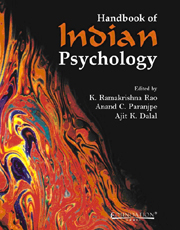Book contents
- Frontmatter
- Contents
- Contributing Authors
- Preface
- 01 Prologue: Introducing Indian Psychology
- 02 Indian Thought and Tradition: A Psychohistorical Perspective
- PART I SYSTEMS AND SCHOOLS
- 03 Jaina Psychology
- 04 The Foundations of Early Buddhist Psychology
- 05 Varieties of Cognition in Early Buddhism
- 06 A Buddhist Theory of Unconscious Mind (Ālaya-Vijñāna)
- 07 Indian Buddhist Theories of Persons
- 08 Buddhist Psychology: A Western Interpretation
- 09 Transpersonal Psychology in the Bhagavad-Gītā: Reflections on Consciousness, Meditation, Work and Love
- 10 Yoga Psychology: Theory and Application
- 11 Patañjali Yoga and Siddhis: Their Relevance to Parapsychological Theory and Research
- 12 Yoga Psychology and the, Sāṃkhyā Metaphysic
- 13 Psychology in the Advaita Vedānta
- 14 The Nyāya-Vaiśeṣika Theory of Perceiving the World of our Experience
- 15 Psychological Theories and Practices in Āyurveda
- PART II TOPICS AND THEMES
- PART III APPLICATIONS AND IMPLICATIONS
- Pronunciation and Transliteration of Sanskrit Alphabet
- Glossary
- Index
11 - Patañjali Yoga and Siddhis: Their Relevance to Parapsychological Theory and Research
from PART I - SYSTEMS AND SCHOOLS
Published online by Cambridge University Press: 26 October 2011
- Frontmatter
- Contents
- Contributing Authors
- Preface
- 01 Prologue: Introducing Indian Psychology
- 02 Indian Thought and Tradition: A Psychohistorical Perspective
- PART I SYSTEMS AND SCHOOLS
- 03 Jaina Psychology
- 04 The Foundations of Early Buddhist Psychology
- 05 Varieties of Cognition in Early Buddhism
- 06 A Buddhist Theory of Unconscious Mind (Ālaya-Vijñāna)
- 07 Indian Buddhist Theories of Persons
- 08 Buddhist Psychology: A Western Interpretation
- 09 Transpersonal Psychology in the Bhagavad-Gītā: Reflections on Consciousness, Meditation, Work and Love
- 10 Yoga Psychology: Theory and Application
- 11 Patañjali Yoga and Siddhis: Their Relevance to Parapsychological Theory and Research
- 12 Yoga Psychology and the, Sāṃkhyā Metaphysic
- 13 Psychology in the Advaita Vedānta
- 14 The Nyāya-Vaiśeṣika Theory of Perceiving the World of our Experience
- 15 Psychological Theories and Practices in Āyurveda
- PART II TOPICS AND THEMES
- PART III APPLICATIONS AND IMPLICATIONS
- Pronunciation and Transliteration of Sanskrit Alphabet
- Glossary
- Index
Summary
[There is a] well-known law of Nature according to which meditation or deep pondering over any idea or principle tends to bring down the corresponding force gradually into our life…. the whole science of acquiring Siddhis or occult powers as expounded in … the Yoga-Sūtras is based on this axiomatic truth of Yogic philosophy…. The word used is Samāpattibhyām which means ‘fusing the mind with.’ This is really what happens when we ponder deeply or meditate on an idea and open up a channel for the influx of its corresponding power.
I. K. Taimni (The Science of Yoga, 1975, p. 256)This chapter treats the Patañjali Yoga-Sūtras and their relevance to contemporary theory and research in parapsychology. A constant feature of this chapter is its description of ways in which Indian psychophysical practises and principles, as illustrated in the Patañjali Yoga-;Sūtras, both inform and are supported by psi (parapsychological) research and theory. Like the Yoga- Sūtras themselves, the chapter has four major sections. These sections will address the context, principles, and practises of the Yoga-Sūtras; the nature, methods, and findings of current parapsychological research; the interrelationships of the Yoga-Sūtras, the siddhis, and psi research; and additional and alternative considerations of Yoga principles and practices.
Patañjali Yoga-Sūtras: Principles and Practices
The Patañjali Yoga-Sūtras is the basic text of Yoga, one of the six great orthodox schools or systems (darśana, views) of Indian philosophy/psychology. These six systems of thought – grouped as three pairs that share metaphysical similarities – are Vaiśeṣika and Nyāya, Sāṃkhya and Yoga, and Mīmāṃsā and Vedānta.
- Type
- Chapter
- Information
- Handbook of Indian Psychology , pp. 217 - 243Publisher: Foundation BooksPrint publication year: 2008
- 11
- Cited by



